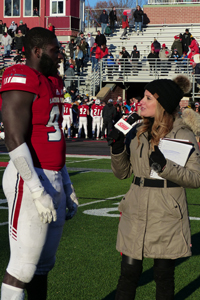How Do You Break Into the Sports Media Industry?
Blizzard: February 24, 2026
Classes before noon on Tuesday, February 24 will remain remote. Review our website for detailed instruction.
Sports broadcasters seem to have a dream job—earning a living watching and talking about big games, star players and the exciting world of college and pro athletics.
And the best ones make it look easy, creating an experience like you’re right there in the stands, cheering on your favorite team.
Ever wonder how you could get in on this fun and fast-paced career?
Find out how a graduate degree can help you transform your passion for the playing field into a rewarding career in sports communication and media, and what to look for in a program.
 Will a master’s degree help me succeed in sports broadcasting?
Will a master’s degree help me succeed in sports broadcasting?
Passion for the subject can certainly play a major role, but it will only take you so far. To thrive in the world of sports journalism, you need a targeted education, soft skills, technical abilities and a professional network. A high-quality sports communication and media graduate program will offer a theoretical, aesthetic and historical understanding of the sports communication field. Acquiring the knowledge and technical skills necessary in the digital world of sports media will help you break into the field and develop the network you need for career mentorship and more.
What should I look for in a sports communication and media master’s program?
 When it comes to graduate degrees in Sports Communication & Media, not all programs are created equally. The field is constantly changing, and the right master’s degree can give you a valuable edge in this competitive and evolving job market. Three things to look for are:
When it comes to graduate degrees in Sports Communication & Media, not all programs are created equally. The field is constantly changing, and the right master’s degree can give you a valuable edge in this competitive and evolving job market. Three things to look for are:
1. A solid graduate track record
Any broadcast journalism school worth its salt should have a host of alumni working as on-air broadcasters, producers, editors and crew. It shows the program is teaching valuable skills and offers the chance for prime internships and networking with alumni. For example, alums of Sacred Heart University's sports communication & media program work for top employers like NBC Sports, ESPN, MLB Network, the New York Jets, Bleacher Report and the Kansas City Chiefs.
2. Internships with major market outlets
A high-quality sports broadcasting master’s degree program should include excellent classroom instruction and opportunities for on-the-job training. Internships that offer hands-on experience with the top sports media companies in major markets will help you stand out in a competitive job market.
3. State-of-the-art facilities
As a graduate student in sports broadcasting, much of your time should be spent building a demo reel—a short professional video that showcases your versatility, charisma and experience to potential employers. It’s important to look for programs that give graduate students access to world-class equipment, software, production studios and labs that will affect your reel’s quality.
What makes a good sports journalist? (Hint: It’s more than just the ability to hold a microphone and talk.)
A stand-out sports media career starts with a quality sports broadcasting program – one that gives students the chance to produce content as both on-air talent and behind-the-scenes camera operators. A well-rounded program should offer extensive multimedia training in graphics production with opportunities to showcase production skills and critical thinking, producing written work, multimedia content and an accomplished digital portfolio/production reel.

How much do sports broadcasters make?
Salaries vary widely for sports media specialists. According to payscale.com, the average sports journalist base salary is $49,870 with some making $133,000 or more.
What sets SHU's Master’s in Sports Communication & Media program apart from other programs?
 Prime location means SHU gives graduate students extensive networking, recruiting and internship possibilities—ESPN, NBC Sports, MLB/NHL Networks, WWE and many other sports media companies are within convenient driving distance of campus.
Prime location means SHU gives graduate students extensive networking, recruiting and internship possibilities—ESPN, NBC Sports, MLB/NHL Networks, WWE and many other sports media companies are within convenient driving distance of campus.
Sports broadcasting graduate students have access to the fully equipped Frank & Marisa Martire Center for the Liberal Arts and Sacred Heart’s West Campus, both of which offer industry-standard production studios, editing suites and interactive laboratories designed to advance students' skills and knowledge needed for the global marketplace. Our professors are working professionals who can mentor and guide students based on their own experience in the field.
Students also benefit from a vast alumni network that is passionate about networking with and supporting current students, with professionals from top sports teams and organizations often coming back to campus to speak with students. Of note, the sports communication & media program at Sacred Heart has been committed to promoting women in sports media since its launch in 2014, including events like our annual Women in Sports Media symposium (with panelists from ESPN, NFL, Disney, NBC Golf, The Atlantic and more), Annual Girls and Women in Sports Day and the student-produced Women in Sports video series.
Think the Sports Communication & Media graduate program at Sacred Heart University might be for you?
Curious about earning your master’s degree in Sports Communication & Media? Talk to Ed Nassr, associate director of graduate admissions & recruitment, at nassre@sacredheart.edu or schedule a virtual appointment today!
 Will a master’s degree help me succeed in sports broadcasting?
Will a master’s degree help me succeed in sports broadcasting?